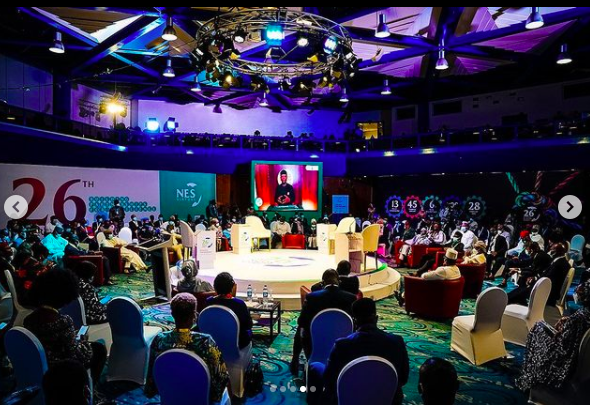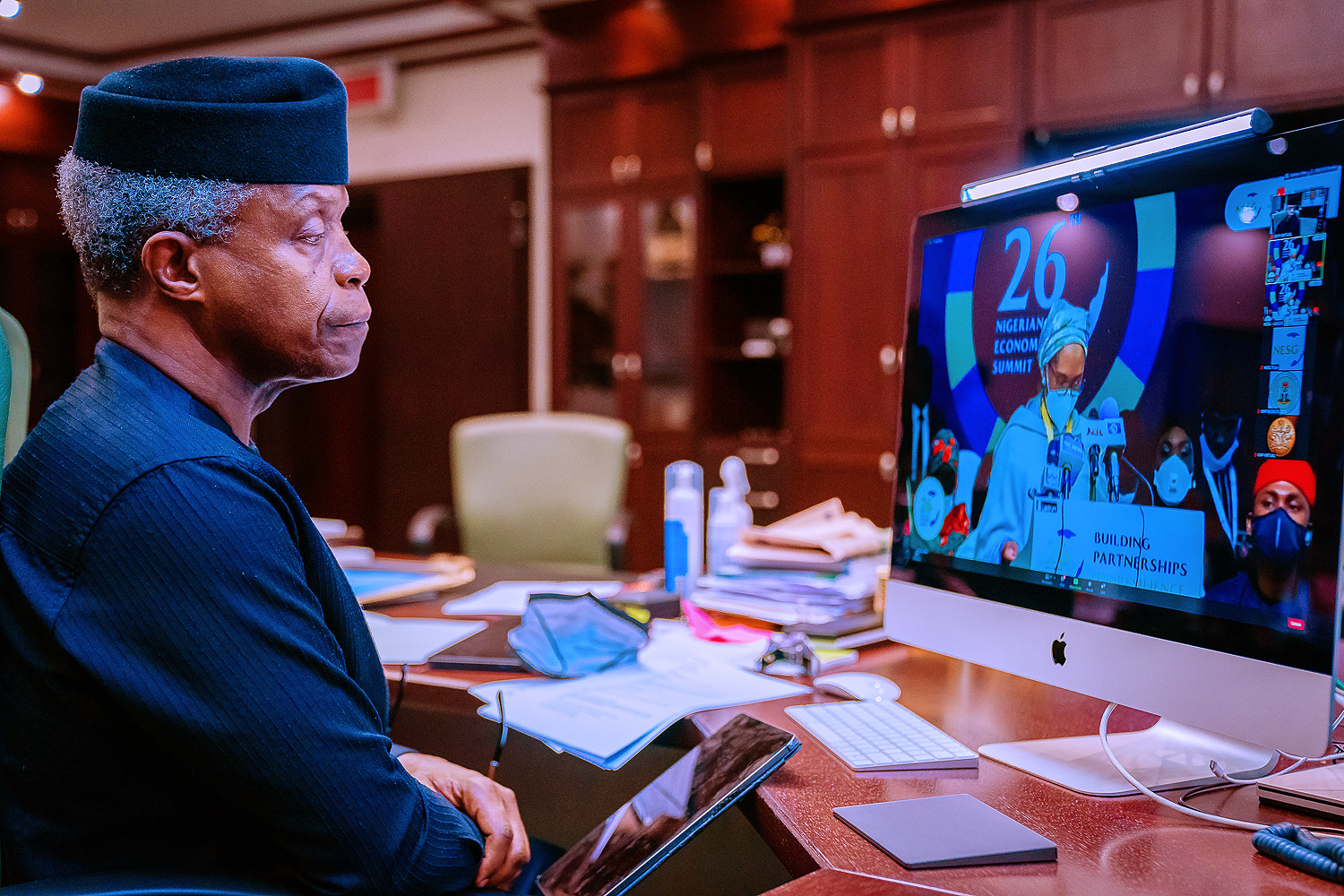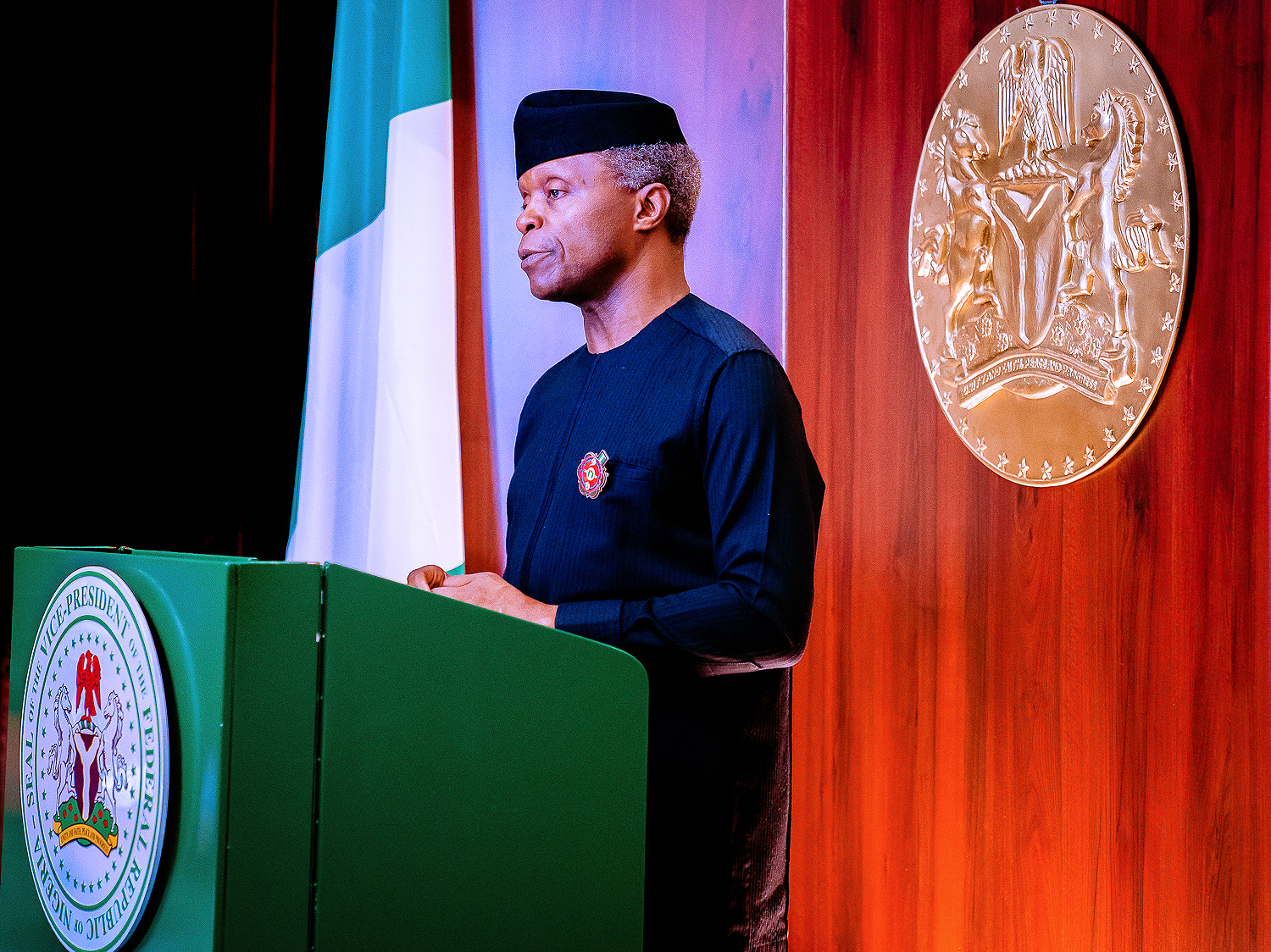Full Remarks At The 26th Nigerian Economic Summit Group Conference
REMARKS BY HIS EXCELLENCY, MUHAMMADU BUHARI, PRESIDENT OF THE FEDERAL REPUBLIC OF NIGERIA, DELIVERED BY HIS EXCELLENCY, PROF. YEMI OSINBAJO, SAN, VICE PRESIDENT, FEDERAL REPUBLIC OF NIGERIA AT THE 26TH NIGERIAN ECONOMIC SUMMIT GROUP CONFERENCE ON THE 23RD OF NOVEMBER, 2020
PROTOCOLS
I am delighted to be with you on this occasion of the 26th Nigerian Economic Summit jointly organised by the Federal Government and the Nigerian Economic Summit Group (NESG) and I join our colleagues in (NESG) in welcoming you all to this event.
Over the years, this forum has provided a veritable platform for an engaging and sincere dialogue on the economy between the public and private sector. The NESG deserve our commendation for their real and virtual efforts to ensure that this summit holds against all odds.
The theme of this Summit – Building Partnerships for Resilience – is particularly apt. If there is one single lesson to be learnt from the COVID-19 pandemic, it is that partnerships are essential for credible responses with lasting effects. Indeed, one is minded to recall the African proverb which says and I quote ‘if you want to go fast, go alone. If you want to go far, go together.’
Our national journey to economic prosperity is a long one, so we must all certainly work together. As we saw, partnerships were essential when we were faced with the serious challenge of combatting COVID-19 pandemic. They are also necessary for framing medium and long-term development plans. They are needed for transforming our economy and certainly indispensable to ensuring that we build a fair and just society.
We saw the key role that partnerships played in our national effort to combat the COVID-19 crisis. While Federal and State Governments worked together to manage the health response and ensure the establishment of isolation centres, availability of test kits, personal protective equipment and medicines. The private sector also played an active role as individual entities and also worked together in groups like the Coalition Against COVID-19.
It is no longer news, of course, that the economy officially entered into recession with the release of the 3rd quarter figures on Gross Domestic Product by the National Bureau of Statistics which showed a decline in growth by -3.62% in that quarter.
We must bear in mind that this decline was after 12 successive quarters of positive growth and came about as a result of the severity of the global downturn caused by the COVID-19 pandemic including lockdowns, disruption in global supply chains, business failures and rising unemployment. We can all recall of course that during the lock-down, farming did not take place, businesses were closed, schools were closed as were hotels and restaurants. Also, airlines stopped flying while inter-state commerce was disrupted, retail trade, of course, also dropped. The economy only began to recover when these activities resumed and if we are able to sustain the nearly three percentage point increase from the second-quarter decline of -6.1%, the performance in the 4th quarter could take us into positive territory.
It was to mitigate this impact that the Federal Government introduced the Economic Sustainability Plan. All the programmes in the ESP are reliant on the private sector playing a key role in creating and conserving jobs and the production and delivery of services in agriculture, housing, solar power, and digital technologies to mention just a few of the sectors.
To take the example of agriculture, with the support of the banking sector, the Federal Government is working to organise finance for farmers and we are also guaranteeing uptake of the produce. This is a mass agriculture programme which the Federal Government has undertaken. 5million farmers have so far been registered and geo-tagged to their farmlands. And about 1.5million of them have been cleared for credit.
On its part, the private sector is responsible for the desired local production, provision of services and associated logistics across the agricultural value chain. We expect that the larger companies and firms operating in all sectors of the economy will also build on this spirit of partnership, by supporting small businesses especially by including them in value chains as suppliers, distributors, contract manufacturers, and service providers amongst other things.
Meanwhile, the Federal Government has provided COVID-19 payroll support to over 16,000 businesses so far with 101,000 of their employees getting between N30,000 to N50,000 in salaries over a three-month period in the initial phase. Up to 500,000 employees will be covered in this way in addition to the support being extended to artisans and road transport workers.
In addition to the positive interventions in the ESP, the Federal Government is also sending the 2020 Finance Bill to further boost economic activity. Some of its provisions include:
• Reduction in duties on tractors, motor vehicles for the transportation of goods and persons.
• Exemption of small companies from payment of education tax under the Tertiary Education Trust fund (TETFUND), companies with less than N25million in turnover are eligible.
• A 50 per cent reduction in minimum tax; from 0.5 per cent to 0.25 per cent for gross turnover for financial years ending between January 1st, 2020 and December 31st, 2021.
• There is also granting of tax relief to companies that donated to the COVID-19 relief fund under the private sector coalition (CACOVID).
• Exemption of minimum wage earners from personal income tax. We are also proposing in the new Finance Act, that those who earn a minimum wage will be exempted completely from personal income tax.
These provisions which complement the tax breaks given to small businesses last year, will only further stimulate the economy but are also a fulfilment of promises made to take steps to help reduce the cost of transportation and the impact of inflation on ordinary Nigerians.
***VP pauses on the delivery of the President’s speech and makes the following intervention in response to previous panel discussions***
The point of the reduction in levies on motor vehicles and commercial vehicles for transportation is to reduce the cost of transportation by reducing the cost of vehicles. With subsidy removal and the increase in fuel price and the pass through to food prices, transportation costs had to be reduced. Now the automotive policy is directed at localizing production of vehicles. The logic has always been and remains that if we increase the duties and levies on imported cars and vehicles, local production becomes more competitive. This is a compelling argument and we stand by it. But the annual demand for vehicles is about 720,000 vehicles per year, but the actual local production of vehicles today by assembly plants that we have is in the order of about 14,000 vehicles a year.
The problem is our current rate of production will not meet the serious national needs and this means higher prices of vehicles and greater strain on other sectors of the economy that depend on transportation. At a time of national economic emergency, especially with rising food prices, rising transportation prices, we have to take some steps which we hope in the end, will not necessarily ruin what we are trying to do in the automobile sector, but will energize other sectors of the economy that were depressed on account of higher transportation cost.
We are not giving up on the automobile industry or policy, two important things to note; one is that we still have relatively high duty, there is still 40% levy on cars, second, we are promoting a policy that governments must buy locally made cars. The Federal Government is committing to buying only locally produced vehicles and we will be relying on the sub-nationals to buy only locally made cars too. We believe that if governments themselves commit to buying these, we will be able to take up most of what is being produced locally and begin a pathway to having our own automobile industry.
***VP ends intervention and resumes delivery of the President’s speech***
There is a speedy pathway out of the current recession if we quicken the implementation of the Economic Sustainability Plan, in addition with what we have done for MSMEs, the increased jobs and local production from agriculture, housing and solar installations, will serve to further boost the economy.
Indeed, when we complete the deployment of the 774,000 jobs (one thousand jobs in every Local Government), this will give further impetus to these efforts.
These programmes will further improve sectors that are performing well such as telecommunications and information services which grew by 17.3% in the 3rd quarter and the finance and insurance sectors, agriculture, and construction which also grew in that period.
An improvement in global economic conditions including the restoration of global supply chains and resumption of exports and remittances should enable a V-shaped recovery. We expect in the same spirit of partnership, that the private sector will complement these efforts, by making maximum use of the provisions of the ESP and the Finance Bill when it is passed by the National Assembly and also by retaining and creating jobs so as to keep people at work.
In a similar spirit of partnership, private sector enterprises should also pay their due taxes. In the context of planning, the private sector notably, the Nigerian Economic Summit Group is working with the Ministry of Finance, Budget and National Planning, to draw up a successor medium-term plan to the Economic Recovery and Growth Plan as well as the 2050 National Vision.
As work proceeds in a very consultative manner on developing these plans and frameworks, it is clear that we must diversify the economy away from dependence on crude oil, speed up human capital development and improve on infrastructure. Above all, our economy must be made more resilient to exogenous shocks.
It is important for the private sector to play a key role as we work together to identify national priorities and to influence our future national trajectory. It is our conglomerates, firms, companies and businesses that must make use of existing opportunities while adjusting to changing global realities in trade, finance, geopolitics, digital technologies and the environment amongst other things.
The recent ratification of the African Continental Free Trade Area and all its agreements is particularly pertinent in this regard. The government worked very closely with the private sector to undertake the ‘AfCFTA Impact and Readiness Assessment’ before signing up to the treaty. The private sector is also part of the National Action Committee for the Implementation of the AfCFTA co-chaired by the Honourable Minister of Industry, Trade and Investment and the Honourable Minister of Finance, Budget and National Planning.
The work of this Committee is vital to ensure that Nigeria can participate effectively in the Free Trade Area once trading starts. The private sector must contribute to the articulation of the national strategy, provide support to our negotiators in AfCFTA processes while taking full advantage of the opportunities provided by this free trade area. This government has always emphasized that the private sector has a key role to play in our efforts to build a more resilient and competitive economy as expressed in the Economic Recovery and Growth Plan.
Private companies in design, construction, logistics, transportation and finance are very much engaged in our infrastructural projects in power and rail as well as roads and bridges and the installation of broadband infrastructure which is an essential requirement if Nigeria is to participate actively and benefit from the 4th Industrial Revolution.
It goes without saying that partnerships remain essential to attract the resources for building a solid national infrastructural base. I am pleased to inform you in this regard that we are working actively with the Central Bank, Nigerian Sovereign Investment Authority and State Governments under the auspices of the National Economic Council to design and put in place a N15trillion Infraco Fund which will be independently managed. The Infraco Fund will help to close the national infrastructural gap and provide a firm basis for increasing national economic productivity and growth.
Your Excellencies, ladies and gentlemen, the incredible advantage of a very large youth population is evident for us to see. The challenge of course is that we must educate equip, train and provide opportunities for them. Because of our numbers that must be done on scale: scale in education, re-skilling and up-skilling, providing credit for young people, in technology and innovation and manufacturing and all other aspects of economic endeavours.
The collaboration amongst public, private and civil society is existential for us as a nation. We have no choice in doing so and our entire budget of about N13trillion is 9% of GDP, 90% of the GDP is actually provided by the private sector. We are committed to making that work.
In closing, let me restate government’s commitment to this dialogue process and assure you that we will consider and adopt recommendations of the Summit and ensure that they are implemented by relevant Ministries, Departments and Agencies (MDAs). It is my sincere wish that working together, we will identify pathways to faster, equitable and sustainable growth that will underpin national development. It is in this regard that I look forward to receiving the report of the Summit.
It is now my honour and privilege to officially declare this 26th Nigerian Economic Summit open.
Thank you very much.






